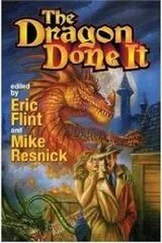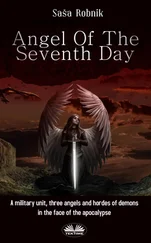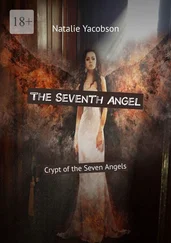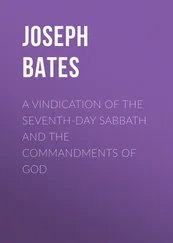The owner of the single hand cried out, “But you just retracted a move yourself.”
“I retracted that move because you did that before.”
“I did that because you retracted your previous move.”
“I retracted that previous move because yesterday you retracted moves.”
“Yesterday it was you who retracted a move first — that was why I did it.”
“The day before yesterday it was you who started it.”
“Well, who started it the day before that?”
The two of them kept up an endless wrangle, accusing each other of retracting moves and tracing their adversary’s history of such misdeeds farther and farther back into the past, from days to months and from months to years.
“I can’t let you take back that move,” the owner of two of the hands cried. “I’m about to win.”
“No, I’m taking back that move,” the owner of the one hand cried.
“I’m not playing with you anymore.”
“I’m not playing with you, either.”
“I’m never going to play with you again.”
“I’ve been wanting to stop playing with you for ages.”
“Let me tell you something: I’m leaving. I’m going to get cremated tomorrow and then go off to my burial ground.”
“I’ve been meaning to get cremated for ages now — can’t wait to get to my burial ground!”
I interrupted their bickering. “I know your story.”
“Everyone here knows our story,” one of them said.
“Newcomers maybe don’t,” the other said.
“Even if they don’t, our story is still kicking ass.”
“Or, to put it more delicately, our story is the talk of the town.”
“I know about your friendship too,” I said.
“Friendship?”
The two of them chortled.
“What’s friendship?” one asked the other.
“Haven’t a clue,” the other said.
Laughing away, they raised their heads, and two pairs of cavernous eyes looked at me. “You’re a newbie, are you?” one of them asked.
“He came with that cute girl,” the other said, before I had time to reply.
The two skeletons lowered their heads and with a titter resumed their game. It was as though they had never been arguing, as though neither of them had ever taken back a move.
After playing for a little while, one of them raised his head. “Do you know what board game we’re playing?”
I glanced at the movements of their hands. “Chinese chess.”
“Wrong. It’s Go.”
Soon the other one turned to me. “Now you know what we’re playing, right?”
“Of course,” I said. “You’re playing Go.”
“Wrong! It’s Chinese chess.”
They then asked me the following question at the same time: “Now what are we playing?”
“If it’s not Go, it’s got to be Chinese chess.”
“Wrong again!” they said. “Now we’re playing Five in a Row.”
They heaved with laughter, each of them making exactly the same gestures, pressing one hand against his own midriff and the other hand on the other’s shoulder. The two skeletons shook with laughter, like withered trees whose intersecting branches tremble together in the wind.
Afterward the two skeletons continued their game, but before long they were in an argument once more, because of yet another retracted move. It seemed to me that they were playing these games just in order to be able to argue, with each of them taking his turn to denounce the other’s record of retracting moves. I stood there listening to the history of their happy chess playing and the history of their happy arguments. Gleefully each fulminated against the other’s vile record of retracted moves, and when their respective surveys of past offenses finally went back as far as seven years earlier, I lost patience, knowing there were another seven or eight years of retracted moves still to be accounted for.
“Which of you is Zhang Gang?” I asked. I hesitated a moment, realizing suddenly the inappropri  ateness of referring to the other man as “the male surnamed Li,” as the newspapers at the time put it. “And which of you is Mr. Li?”
ateness of referring to the other man as “the male surnamed Li,” as the newspapers at the time put it. “And which of you is Mr. Li?”
“Mr. Li?”
They looked at each other, then burst into gales of laughter.
“Why don’t you guess?” they both said.
I studied them carefully, and to me the two skeletons looked exactly alike. “I’ve no idea,” I told them. “You could be twins, as far as I can tell.”
“Twins?” Again they burst into laughter. Then, once more, they resumed their game in the most cordial of moods. The tempestuous argument of a moment earlier had vanished into thin air after my interruption.
Soon they were back to their old tricks, asking me, “Do you know what game we’re playing?”
“Chinese chess, Go, Five in a Row.” I recited all the possibilities.
“Wrong!” they chortled. “We’re playing Chinese checkers.”
Once again they burst out laughing and again I saw each of them gripping his midriff with one hand and clapping the other hand on his adversary’s shoulder. The two skeletons shook with a tidy rhythm.
I laughed too. More than ten years ago, the two of them had come here, six months apart. The grudge between them had not crossed the frontier between life and death. Enmity had been sealed off in that departed world.

My search continued endlessly, like the hands on a clock that go round and round but can never leave the dial. My father was nowhere to be found.
Several times I ran into a crowd of skeletons, dozens of them. They were not like the other skeletons that sometimes gathered together and sometimes separated — this crowd stayed consistently together as they walked, a little like the moon’s reflection on water, which keeps floating in a discrete shape no matter how the waves tug.
The fourth time I ran into this bunch, I came to a halt and so did they. We sized each other up. Their hands were linked and their bodies leaned on each other, and they grouped together like a flourishing tree whose branches spread high and low. I knew that among them there were men and women, old and young. I smiled and greeted them.
“Hello!” they responded in unison, a chorus of male and female voices, hoarse old voices and tender young voices, and I saw a cheerful outlook in their empty eyes.
“How many of you are there?” I asked.
“Thirty-eight,” they answered.
“Why are you always together?”
“We arrived at the same time,” a man’s voice answered.
“We’re all one family,” a woman’s voice added.
Then I heard a boy’s voice. “Why are you on your own?”
“I’m not entirely on my own.” I looked down at the black armband on my left arm. “I’m looking for my father. He’s wearing a railroad uniform.”
Another voice piped up from among the skeletons in front of me. “We haven’t seen anyone in a railroad uniform.”
“He may have changed his clothes before coming here,” I said.
The crisp voice of a little girl rang out. “Daddy, is he new here?”
“Yes,” the male voices said.
“Mom, is he new here?”
“That’s right,” the female voices said.
“Are they all your moms and dads?” I asked the little girl.
“That’s right,” she said. “In the past I just had one mom and one dad, but now I’ve got lots of moms and lots of dads.”
“How did you get here?” the boy who’d addressed me earlier asked.
“I think it was a fire,” I said.
“How come he’s not burned?” he asked the skeletons next to him.
I could feel their silent, rapt gaze. “After I saw the fire,” I told them, “I heard an explosion and the building must have collapsed.”
Читать дальше
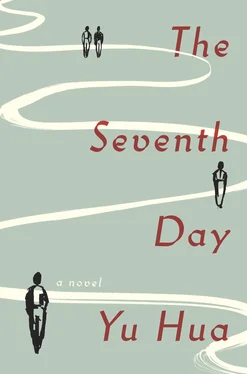
 ateness of referring to the other man as “the male surnamed Li,” as the newspapers at the time put it. “And which of you is Mr. Li?”
ateness of referring to the other man as “the male surnamed Li,” as the newspapers at the time put it. “And which of you is Mr. Li?”



